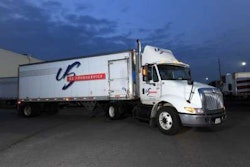Werner Enterprises on Monday, July 20, reported revenues and earnings for the second quarter ended June 30. Revenues decreased 30 percent to $403.1 million in second quarter 2009 compared to $578.2 million in second quarter 2008. Trucking revenues, excluding fuel surcharges, declined 16 percent to $310.1 million compared to $368.6 million. Value Added Services revenues declined 25 percent and were $50.5 million compared to $67.6 million. Net income declined to $12.7 million from $18.1 million.
The Omaha, Neb.-based company said the freight market was challenging in second quarter 2009 but that freight volumes improved from the extremely weak shipping levels experienced during first quarter 2009. The company said it experienced some seasonal freight improvement as the quarter progressed from April to May to June, but that second-quarter 2009 freight comparisons were well below volumes during the same period in 2008, in part since June 2008 was the strongest freight month for the company during 2008. The company said management is cautiously optimistic that freight is bottoming, but it remains difficult thus far in July 2009.
Werner said it proactively adapted to the softer freight market conditions by reducing its fleet size by 10 percent when comparing second quarter 2009 to second quarter 2008; fewer trucks and a 16 percent shorter length of haul reduced the company’s total miles by 14 percent over this same period. Werner said having fewer trucks in service also lowered the company’s freight requirements and thereby reduced the company’s need to book less attractive and less profitable freight to keep its trucks and drivers productive; however, a smaller fleet results in lower revenues and operating income, assuming a constant operating margin percentage.
The company said it does not expect a meaningful improvement of its operating ratio in the near term, unless there is an improvement in the freight market or a reduction in capacity due to an increase in carrier failures. Management believes that excess capacity is being supported by lender leniency that ultimately is not sustainable. Based on current market conditions, the company does not plan to make further significant reductions to its fleet unless there is a significant decline in the freight market or a loss of customer business.









